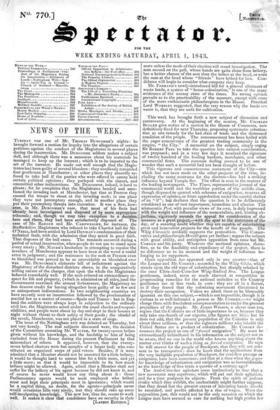NEWS OF THE WEEK.
TUESDAY was one of Mr. THOMAS DUNCOMBE'S nights : he brought forward a motion for inquiry into the allegations of certain petitions against the conduct of the Magistrates in several places during the insurrection. Mr. DUNCOMBE seldom makes a subject
dull, and although there was a sameness about his materials he managed to keep up the interest ; which is to be imputed to the art of the narrator. He made out well enough that the Magis- trates had been guilty of several blunders : they needlessly remanded four gentlemen at Manchester ; at other places they absurdly re- fused to take bail if the parties who were offered in surety held certain political opinions ; they parleyed with the rioters, and committed other indiscretions. Mr. DUNCObIBE, indeed, is hard to please ; for he complains that the Magistrates headed and sanc- tioned the invading mob at Manchester, but that at Preston they caused the troops to shoot at the invading mob ; in one place they were not peremptory enough, and in another place they put their peremptory threats into execution. It was a flaw, how- ever, in Mr. DUNCOMBE'S case, that most of his facts had already been investigated and disposed of by more appropriate tribunals ; and, though we may take exception to a decision here and there, they had been satisfactorily disposed of. The case of Mr. BADGER and Mr. CARTWRIGHT, for instance, the Staffordshire Magistrates who refused to take Chartist bail for Mr. O'Nr.u,L, had been settled by Lord BERMAN'S condemnation of their technical fault, with the admission that they acted in good faith. That disposes of the bail cases. The remands occurred during a 'period of actual insurrection' when people do not use to stand upon every nicety ; Mr. MAUDE'S hesitation in attempting to repulse the invaders of Manchester appears to have been at the worst a venial error in judgment ; and the resistance to the mob at Preston even to bloodshed was proved to be as unavoidable as bloodshed ever was. Mr. DUNCOMBE'S elaborate bill of indictment against the Magistracy of the disturbed districts shows, in the comparatively trifling nature of the charges, that upon the whole the Magistrates behaved remarkably well. If the mob evinced an extraordinary re- spect for life and property, (which is admitted on all sides,)and the Government exercised the utmost forbearance, the Magistracy no less deserve credit for having altogether been guilty of so few and so unimportant indiscretions. In two neighbouring countries we have recently seen an insurrection followed by the proclamation of martial law as a matter of course—Spain and France : but in Eng- land the soldiers were always kept in subjection to the ordinary civil law, the Magistrates acted under the usual checks and respon- sibilities, and people went about by day and slept in their houses at night without threat to their safety or their goods ; the citadel of the revolt, Manchester, was not placed in a state of siege.
The issue of the Nottingham writ was debated on Thursday, but not very keenly. The real subjects discussed were, the decision of the Committee unseating Mr. WALTER for twenty-seven bribes
given without his knowledge, and the hardship to him of being excluded from the House during the present Parliament by that misconduct of others. It appeared, however, that the twenty- seven bribed electors were but samples of a larger body who con- stituted an organized corps of paid voters. Besides, if it were admitted that a Member should not be unseated for a little bribery, it would be thought hard to unseat him for a little more, and yet a little more ; so that it would be impossible to fix how much bribery might be allowed. Again, admit that a Member shall not suffer for the bribery of his agent because he did not know it, and of course he never would know any thing about it : those Parliamentary agents would be most employed who bribed most and kept their principals most in ignorance ; which would be a capital thing, no doubt, for the agents—principals never would scrutinize bills very nicely, lest they should rake up some self-inculpating knowledge. The new law, thus far, seems to work well. It makes it clear that candidates have no security in their
seats unless the mode of their election will stand investigation. The man second on the poll, whose hands are quite clean from bribery, has a better chance of the seat than the briber at the head, or even the man at the head whose "friends" have bribed for him. Can- didates will begin to consider what company they keep.
Mr. PERRAND'S newly-introduced bill for a general allotment of waste lands, a system of "home-colonization," is one of the many evidences of the uneasy state of the times. No strong opinion prevails as to the practicability of the measure, except with some of the more enthusiastic philanthropists in the House. Practical Lord WoitsLEr suggested, that the very reason why the lands are waste is, that they are unfit for cultivation.


























